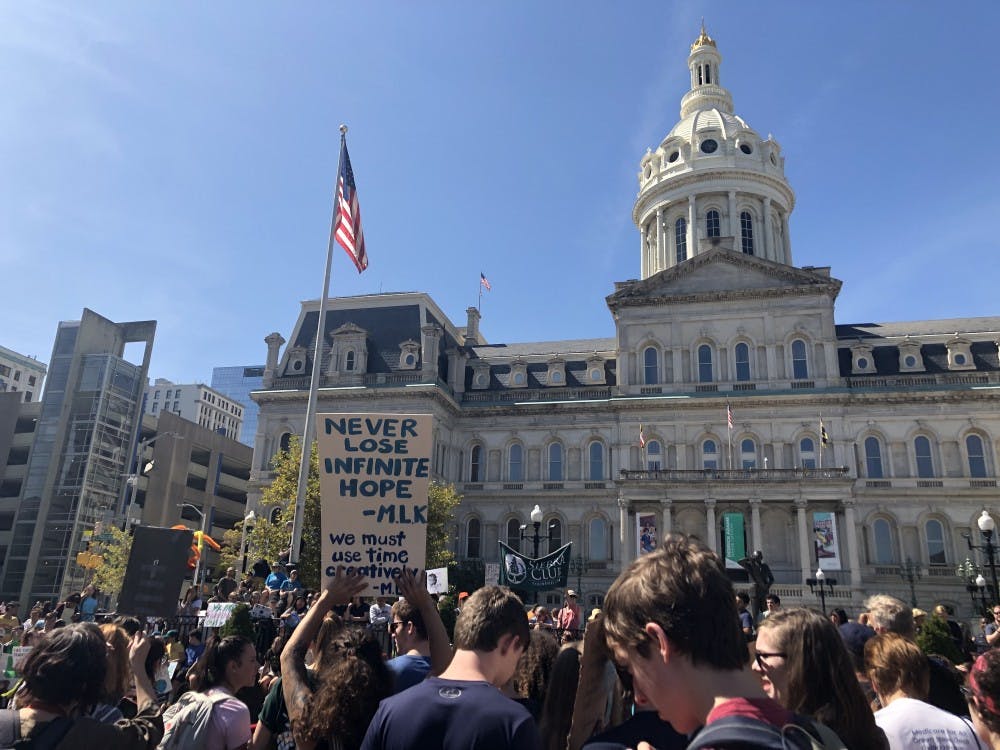The recent work of 16-year-old Swedish climate activist Greta Thunberg has inspired waves of renewed interest in climate change in both younger and older populations. On Friday, Sept. 20, a series of school walk-outs were staged across the world in an act of protest demanding that governments take action against climate change.
Here in Baltimore, a rally was organized by Baltimore city students. At 8:30 a.m. on Friday, activists gathered at the Bryn Mawr School in North Baltimore and proceeded to march down Charles Street until noon, when a demonstration was held at the Inner Harbor.
Trinity Eimer is one of the students who helped to organize the march. She explained that her interest in the topic is not new.
“I’ve been interested in sustainability from a young age,” Eimer said. “When I was in elementary school, I established an unofficial club called ‘Green Girls’... We spent recess picking up litter and dreaming of renewable energy.”
Eimer’s interest has only continued to flourish since her childhood days, as she has adapted her lifestyle to align with her values of sustainability and serves as President of Bryn Mawr’s Environmental Coalition.
For those who have not been as involved with climate change activism and sustainability, the globally organized rallies offered a bit more insight into the gravity of the situation and the necessity of a united effort to combat the problem. Eimer remarked that the strike was a way to engage with the issues facing the environment locally.
“Organizing this rally was a way for me to create drastic action within my own community, showing people that they are not helpless in the face of adversity,” Eimer said.
Many residents of Baltimore attended the rally, including those in the Hopkins community. Honor Zetzer, a sophomore majoring in Economics, had never taken part in a protest prior to this one. She explained that she decided to attend to be a part of a global movement.
“It is a universal problem, and Friday was a day when everyone, everywhere, was getting together to say something about it,” Zetzer said.
She felt the excitement of taking part in a large movement like the climate strike and highlighted how social media has helped to mobilize people and become more civically engaged. Some Hopkins students ventured to other locations for “sister strikes” with many traveling to Washington D.C. or New York City. Zetzer expressed her reason for attending in Baltimore and encouraged other students to consider acting locally.
“Hopkins students: Show up for Baltimore! I get that it’s fun to go to D.C. and take part in protests in the capital, but Baltimore needs voices fighting for it,” Zetzer said. “The size of the crowd in Baltimore was smaller than protests I have seen in Cleveland, and Baltimore is about twice the size of that city.”
Lauren Fink, a junior majoring in Neuroscience with a minor in Mathematics, was also in attendance. She felt a duty to show up and provide support to other participants, who were mainly high school students who could face repercussions for skipping out on Friday classes. Fink explained that this protest was special in part because of the age of those who led it.
“I was proud that it was young people participating and young people leading it, because young people are going to be the ones affected,” Fink said.
Her favorite part of the event was hearing accounts from seventh graders and witnessing their passion and desire to incite change. Fink explained that these young activists even engaged with professional representatives from the city.
“There were some adults present from the Mayor’s office and who worked for the City of Baltimore, and the young people were very educated on the things that Baltimore City hasn’t done or has done wrong when it comes to climate change, like environmental sustainability,” Fink said. “Seeing very young people calling powerful figures out was very inspirational as well.”
For some high school and middle school students, punishment from their school for attending the rally was an obstacle to overcome. Eimer expressed her belief that the strike was a worthwhile substitute to a regular school day.
“While I understand that Baltimore’s schools have a responsibility to ensure students attend class, I also firmly believe that this protest merits an excused absence at the very least,” Eimer said.





